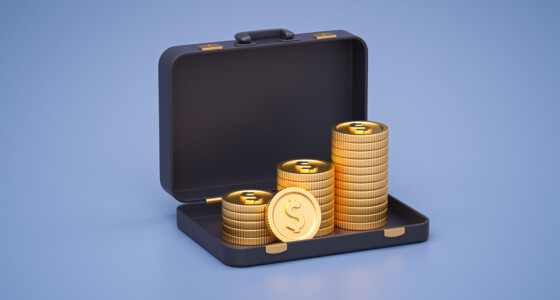

Have you ever wondered which currency has the most value? In this article, we will discuss everything there is to know about the world’s top 16 most influential currencies. We use the US dollar as the fixed base currency in our comparison. Thus, the strongest currency is the most expensive compared to the US dollar.
Note! Given that exchange rates are constantly changing, the data when reading the article may differ.
1. Kuwaiti Dinar
The Kuwaiti dinar (KWD) is regarded as the most influential currency. It was first established in 1960 and initially had a value equal to one pound sterling. Kuwait is a tiny country sandwiched between Iraq and Saudi Arabia, and its substantial oil exports to other countries have its primary income source.
Furthermore, the Kuwaiti dinar is tied to a basket of major international currencies, including the US dollar. In conjunction with sound financial management, this pegging method established trust in the currency and strengthened its strength. The Kuwaiti dinar’s position as the world’s strongest currency reflects the country’s economic growth, prudent financial policies, and essential role in the global oil business.
The Kuwaiti dinar is the globe’s highest-valued currency unit per face value, as you only get 0.30 dinar for every US dollar you exchange.
2. Bahrain Dinar
The Bahrain dinar, or BHD, is the second most powerful currency. It is split into 1000 smaller units of currency, known as “fils,” just like most Arabic currencies discussed on this list. A Bahraini dinar is equivalent to 0.38 US dollars and has an identical value to the Omani rial.
3. Omani Rial
The Omani rial (OMR) serves as the official currency of Oman. Unlike most traditional currencies, the Omani rial is divided into 1000 smaller parts known as baisa. The success of Oman’s oil exports and peg to the US dollar caused the Omani rial to appreciate swiftly after it was adopted. One can exchange approximately 0.38 Omani Rials for 1 US dollar, roughly twice as strong as the Pound sterling.
4. Jordan Dinar
The Jordanian dinar, sometimes known as the JOD, is the country’s official currency and currently ranks as the fourth-strongest currency in the whole world. In 1950, it succeeded the Palestinian pound as the lawful tender of Jordan. The Jordanian dinar is the 4th most valued currency, with 1 US dollar equivalent to approximately 0.71 dinars.
5. Pound Sterling
The GBP, often known as the pound sterling or the Great British Pound, is the 5th most valued currency in the world. The GBP retains the distinction of being the most ancient currency currently in existence, even if it is not the entire globe’s most powerful currency. The pound sterling is the most robust and commonly used currency globally and is frequently regarded as such. Additionally, it ranks as the fourth-most traded currency internationally, making up around 12.8% of every day on the FX market.
You will receive about 0.75 Great British pounds in exchange for 1 US dollar. This currency pair, GBP/USD, is among the most traded globally and is called “Cable” in everyday speech.
6. Gibraltar Pound
The Gibraltar pound (GIP) is the official currency of Gibraltar. The Gibraltar pound’s interchangeability with the GBP at its nominal value is one aspect that sticks out. As a result, merchants and investors in Gibraltar can conduct business using the GIP and the GBP.
According to current currency rates, 0.81 Gibraltar pounds equals 1 US dollar.
Due to historical links between Gibraltar and the UK, this puts the worth of the GIP near to that of the pound sterling. The ability to easily use either currency for everyday transactions gives tourists and residents of Gibraltar flexibility and convenience due to the changeable nature of the GIP and GBP. It does away with the necessity for currency conversion and makes local financial transactions easier.
7. Cayman Islands Dollar
The Cayman Islands dollar (KYD) is the country’s official currency and ranks as the 7th highest-valued currency in the world. The Cayman Islands is an independent British territory in the Caribbean. The Cayman Islands dollar is the sole and most powerful Caribbean currency on this list, trading for approximately 0.83 US dollars.
8. Euro
The Euro is among the newer currencies than the other ones discussed on this list. It is the official currency of 19 nations, making it the most frequently used official currency globally. It is commonly referred to as the second most significant reserve currency globally since the governments of France, Spain, and Germany use it as their official currency. On the foreign exchange market, it is also acknowledged to be the second-highest traded currency, just after the US dollar.
The USD/EUR pair, often known as “Fibre”, accounts for approximately one-quarter of all daily market trades, making it the most popular currency pair globally. You will get around 90 cents or 0.90 euros for every US dollar.
9. Swiss Franc
Switzerland and Liechtenstein use the Swiss franc as their official currency (CHF). CHF is the initial currency, with a higher value than the US dollar (equivalent to about 0.98 CHF). However, this is unsurprising since Switzerland is considered one of the world’s most prosperous and stable countries. Along with the JPY and USD, it serves as inflation insurance for investors during economic unrest.
The Swiss franc has become the 9th most transacted currency globally thanks to its low debt ratios and rigorous monetary policies.
10. US Dollar
The US dollar serves as the national currency of the US and the reserve currency of many other nations. It is managed by most commercial and central financial entities worldwide. Due to its extensive use, the US dollar makes up around 88.3% of daily trades on the foreign exchange market.
Despite dominating numerous rankings, including the wealthiest nation in the world, the US dollar only ranks 10th compared to other contenders for the position of the strongest currency globally. One US dollar is precisely a value of 1 US dollar.
11. Canadian Dollar
The official currency of Canada is the Canadian dollar (CAD), which is also frequently utilized by central banking systems as the primary reserve currency for foreign exchange transactions. Traders have more faith in the CAD as a highly reliable store of value because of Canada’s ability to establish a solid political and legal stability reputation.
Many traders and investors worldwide believe in the potential of the Canadian Dollar, which is gaining considerable appeal on the market. The CAD represents approximately five percent of all daily trading on the international currency market, demonstrating its substantial influence and liquidity.
The Canadian dollar ranks 11th on the chart of the world’s most vital and most valuable currencies thanks to its exchange rate of 1.31 to the US dollar. One must remember, nevertheless, that the Canadian dollar has popularity and demand much above its stated value. The Canadian dollar (CAD) attraction to investors and traders globally is greatly influenced by elements including Canada’s abundant natural reserves, stable financial system, and strong economy.
12. Libyan Dinar
Libyan dinar, or LYD in short, is the name of the country’s official currency. Contrary to many other currencies, which split a unit of currency into multiples of 100, the Libyan dinar divides into 1000 dirhams. One can purchase approximately 1.41 Libyan Dinars by exchanging 1 US dollar. LYD remains a powerful currency despite not being the most valued globally.
13. Brunei Dollar
Since 1967, the Brunei dollar (BND) has functioned as the Sultanate of Brunei’s officially recognized currency. An interesting fact about this currency is that it is, at face value, equivalent to the Singapore dollar. As a result, both currencies are regarded as legitimate forms of currency in each nation, facilitating effortless commerce and mutually beneficial economic relations between Singapore and Brunei.
One can purchase approximately 1.35 Brunei dollars with one US dollar. It demonstrates that the Brunei dollar is more expensive than the Singapore dollar. Except for a slight price difference, these currencies are relatively stable and well-accepted in the business sector in their respective regions.
14. Singapore Dollar
In addition to being used extensively in Brunei, the Singapore dollar (SGD) is Singapore’s official currency. The SGD is another premium currency, with an estimated 1.36 Singaporean dollar to US dollar conversion rate. This currency ranks 14th most traded internationally, representing around 1.8% of all daily FX transactions. It demonstrates the Singapore dollar’s substantial presence and strong liquidity in world currency markets.
Singapore’s strong economy, stable government, and competent financial system are the main drivers of SGD’s appeal. Singapore is also recognized as the world’s financial center and attracts foreign investors, another factor driving consumer interest in the Singapore dollar.
15. Australian Dollar
As well as being widely used in Australia’s overseas territories and the Pacific island nations, the Australian dollar (AUD) is the nation’s official currency. Although it is among the most pricey currencies in the world, it is widely known for its stability and enormous worth. Currently, one US dollar will exchange for about 1.45 Australian dollars, making it one of the more costly forms of currency. Moreover, with 6.8% of daily deals, the Australian dollar ranks as the fifth most traded currency on the foreign exchange market.
The stability of the exchange rate, perceived advantages linked with diversification, and high-interest rates are some essential elements strongly linked to its popularity among traders and investors. One can understand the AUD’s future direction through risk-free trading in demo accounts, which provide virtual cash for trading several currencies, including the Australian dollar. The market’s mechanics will ultimately determine whether the AUD moves up the rankings or falls.
16. New Zealand Dollar
Due to several variables, the New Zealand dollar (NZD) has established itself as one of the strongest currencies in the world. One of the main drivers of the currency’s performance is its upward trend, which is possible because of New Zealand’s high-interest rates, political stability, and strong GDP growth in the last few decades. Currently, one US dollar will buy around 1.52 New Zealand dollars.
The New Zealand dollar surpasses several other strong currencies and is in the top 10 most traded currencies while being the 16th strongest currency overall. It illustrates the NZD’s worldwide appeal among investors and traders and its strong position in the global foreign exchange (FX) markets.
The bottom line
Ultimately, economic growth, interest rates, stability, and other factors are critical determinants of the world’s strongest currencie











